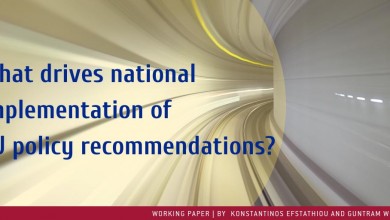This policy contribution was published by Bruegel. Please find the pdf here. The piece was nicely covered by Martin Wolf in the FT.
This paper links the major divergences between the three largest euro-area countries in terms of unit labour costs and current accounts, to the broader debate on labour income shares. We show that Germany, like the United States and Japan, has experienced a significant decline in the share of national income that goes to labour. At the same time, labour shares in France and Italy have increased since the beginning of monetary union, breaking a trend that had persisted for several decades. The capital intensity of production has increased much more significantly in France and Italy, while in Germany the capital-to-GDP ratio has stagnated and the net public capital stock has fallen. Our data suggests that capital and labour have been complements.
To address divergences within the euro area, Germany will need to increase its capital stock. Our data suggests that by increasing it, simultaneously the labour income share will increase. Investment and raising the purchasing power of households (and reducing corporate savings) would contribute to a smaller current account surplus. Increasing labour market supply by adjusting labour market institutions that effectively exclude part of the population could be a complementary policy for France and Italy to pursue in order to narrow the gap with Germany.
Our data indicates a genuine policy problem. At its core are different approaches to dealing with the impact on domestic labour markets of technological change and globalisation, and the effects of monetary union on capital allocation. Different approaches have led to a large and relatively persistent divergence that manifests itself in high structural unemployment in France and Italy and large current-account surpluses in Germany. Addressing this divergence remains the core challenge for euro-area policymakers.

